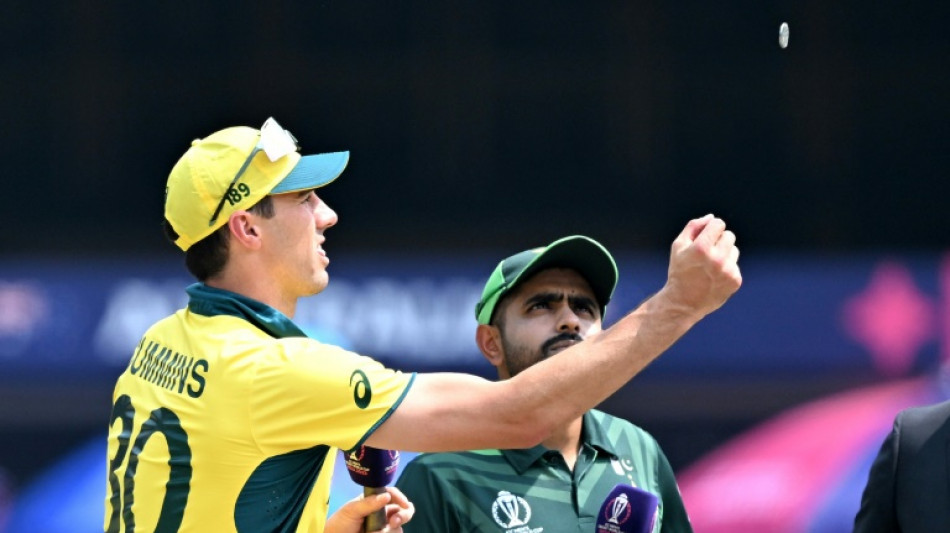
-
 Putin evokes WWII victory to rally Russia behind Ukraine offensive
Putin evokes WWII victory to rally Russia behind Ukraine offensive
-
China exports beat forecasts ahead of US tariff talks

-
 Leo XIV, the 'Latin Yankee', to celebrate first mass as pope
Leo XIV, the 'Latin Yankee', to celebrate first mass as pope
-
Most stocks lifted by hopes for US-China talks after UK deal

-
 IPL suspended indefinitely over India-Pakistan conflict: reports
IPL suspended indefinitely over India-Pakistan conflict: reports
-
German lender Commerzbank's profits jump as it fends off UniCredit

-
 Rare bone-eroding disease ruining lives in Kenya's poorest county
Rare bone-eroding disease ruining lives in Kenya's poorest county
-
India says repulsed fresh Pakistan attacks as de-escalation efforts grow

-
 Zhao's historic snooker title sparks talk of China world domination
Zhao's historic snooker title sparks talk of China world domination
-
'High expectations': EU looks to Merz for boost in tough times

-
 Poisoned guests rarely invited before deadly mushroom lunch, Australia trial hears
Poisoned guests rarely invited before deadly mushroom lunch, Australia trial hears
-
China sales to US slump even as exports beat forecasts

-
 Indian cricket to make 'final decision' on IPL over Pakistan conflict
Indian cricket to make 'final decision' on IPL over Pakistan conflict
-
Dethroned Bundesliga champions Leverkusen face uncertain future

-
 China can play hardball at looming trade talks with US: analysts
China can play hardball at looming trade talks with US: analysts
-
French monuments in trouble while PSG prepare for Champions League final

-
 Newcastle face Chelsea in top five showdown, Alexander-Arnold in spotlight
Newcastle face Chelsea in top five showdown, Alexander-Arnold in spotlight
-
Flick's Barca must show 'hunger' in crunch Liga Clasico

-
 Clasico the last chance saloon for Ancelotti's Real Madrid
Clasico the last chance saloon for Ancelotti's Real Madrid
-
Timberwolves overpower Warriors to level series

-
 Chinese fabric exporters anxious for US trade patch-up
Chinese fabric exporters anxious for US trade patch-up
-
Putin gears up to host world leaders at lavish army parade

-
 Nearing 100, Malaysian ex-PM Mahathir blasts 'old world' Trump
Nearing 100, Malaysian ex-PM Mahathir blasts 'old world' Trump
-
Leo XIV, first US pope, to celebrate first mass as pontiff

-
 Asian stocks lifted by hopes for US-China talks after UK deal
Asian stocks lifted by hopes for US-China talks after UK deal
-
Former head of crypto platform Celsius sentenced 12 years

-
 Ex-model testifies in NY court that Weinstein assaulted her at 16
Ex-model testifies in NY court that Weinstein assaulted her at 16
-
Genflow Biosciences PLC Announces Share Subscription, Director's Dealing and Update

-
 Argo Blockchain PLC Announces 2024 Annual Results and Restoration of Listing
Argo Blockchain PLC Announces 2024 Annual Results and Restoration of Listing
-
'Great honor': world leaders welcome first US pope

-
 Pacquiao to un-retire and fight Barrios for welterweight title: report
Pacquiao to un-retire and fight Barrios for welterweight title: report
-
Trump unveils UK trade deal, first since tariff blitz

-
 Man Utd one step away from Europa League glory despite horror season
Man Utd one step away from Europa League glory despite horror season
-
Jeeno shines on greens to grab LPGA lead at Liberty National

-
 Mitchell fires PGA career-low 61 to grab Truist lead
Mitchell fires PGA career-low 61 to grab Truist lead
-
AI tool uses selfies to predict biological age and cancer survival

-
 Extremely online new pope unafraid to talk politics
Extremely online new pope unafraid to talk politics
-
Postecoglou hits back as Spurs reach Europa League final

-
 Chelsea ease into Conference League final against Betis
Chelsea ease into Conference League final against Betis
-
Pope Leo XIV: Soft-spoken American spent decades amid poor in Peru

-
 First US pope shared articles critical of Trump, Vance
First US pope shared articles critical of Trump, Vance
-
'Inexcusable' - NBA champs Boston in trouble after letting big leads slip

-
 US automakers blast Trump's UK trade deal
US automakers blast Trump's UK trade deal
-
Stocks mostly rise as US-UK unveil trade deal

-
 Trump presses Russia for unconditional 30-day Ukraine ceasefire
Trump presses Russia for unconditional 30-day Ukraine ceasefire
-
Anything but Europa League glory 'means nothing' for Man Utd: Amorim

-
 'Inexcuseable' - NBA champs Boston in trouble after letting big leads slip
'Inexcuseable' - NBA champs Boston in trouble after letting big leads slip
-
Pope Leo 'fell in love with Peru'and ceviche: Peru bishop

-
 Pakistan's T20 cricket league moved to UAE over India conflict
Pakistan's T20 cricket league moved to UAE over India conflict
-
India tells X to block over 8,000 accounts


Coin tosses are not 50/50: researchers find a slight bias
Want to get a slight edge during a coin toss? Check out which side is facing upwards before the coin is flipped –- then call that same side.
This tactic will win 50.8 percent of the time, according to researchers who conducted 350,757 coin flips.
For the preprint study, which was published on the arXiv database last week and has not yet been peer-reviewed, 48 people tossed coins of 46 different currencies.
They were told to flip the coins with their thumb and catch it in their hand -- if the coins fell on a flat surface that could introduce other factors such as bouncing or spinning.
Frantisek Bartos, of the University of Amsterdam in the Netherlands, told AFP that the work was inspired by 2007 research led by Stanford University mathematician Persi Diaconis -- who is also a former magician.
Diaconis' model proposed that there was a "wobble" and a slight off-axis tilt that occurs when humans flip coins with their thumb, Bartos said.
Because of this bias, they proposed it would land on the side facing upwards when it was flipped 51 percent of the time -- almost exactly the same figure borne out by Bartos' research.
While that may not seem like a significant advantage, Bartos said it was more of an edge that casinos have against "optimal" blackjack players.
It does depend on the technique of the flipper. Some people had almost no bias while others had much more than 50.8 percent, Bartos said.
For people committed to choosing either heads or tails before every toss, there was no bias for either side, the researchers found.
None of the many different coins showed any sign of bias either.
Happily, achieving a fair coin flip is simple: just make sure the person calling heads or tails cannot see which side is facing up before the toss.
- 'It's fun to do stupid stuff' -
Bartos first heard of the bias theory while studying Bayesian statistics during his master's degree, and decided to test it on a massive scale.
But there was a problem: he needed people willing to toss a lot of coins.
At first he tried to persuade his friends to flip coins over the weekend while watching "Lord of the Rings".
"But nobody was really down for that," he said.
Eventually Bartos managed to convince some colleagues and students to flip coins whenever possible, during lunch breaks, even while on holiday.
"It will be terrible," he told them. "But it's fun to do some stupid stuff from time to time."
The flippers even held weekend-long events where they tossed coins from 9am to 9pm. A massage gun was deployed to soothe sore shoulders.
Countless decisions have been made by coin tosses throughout human history.
While writing his paper, Bartos visited the British Museum and learned that the Wright brothers used one to determine who would attempt the first plane flight.
Coin tosses have also decided numerous political races, including a tied 2013 mayoral election in the Philippines.
But they are probably most common in the field of sport. During the current Cricket World Cup, coin tosses decide which side gets to choose whether to bat or field first.
J.Williams--AMWN


